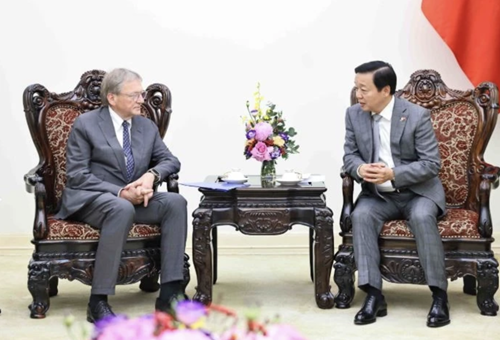Ha highly valued Russia's cooperation with and support to Vietnam in scientific research, technology application and transfer, expressing his hope that the two countries will jointly exchange and promote global cooperation initiatives to better achieve goals related to environmental protection, carbon emission reduction, and climate change adaptation.
    |
 |
|
Deputy Prime Minister Tran Hong Ha (right) receives Boris Yuryevich Titov, Special Envoy of the Russian President for relations with International Organisations for the Achievement of Sustainable Development Goals in Hanoi on January 15. |
During his official visit to Vietnam from January 14-15, Russian Prime Minister Mikhail Mishustin proposed solutions such as carbon sequestration, using nuclear energy integrated with renewable energy, circular economy practices, and green fuel production, he said.
With a strong determination towards to sustainable development goals, Vietnam aims to make more contributions to joint efforts in addressing global environmental and climate challenges, Ha stressed.
For his part, Titov said Russia is prioritising the implementation of policies on climate change mitigation and environmental protection to ensure sustainable development.
Russia has initiated the establishment of specialised councils on sustainable development and climate under the frameworks of the Shanghai Cooperation Organisation (SCO) and BRICS to find effective solutions for achieving sustainable development goals (SDGs), fostering economic growth, and implementing climate change-related policies, he said, adding that the country is willing to share relevant scientific research results and technologies.
Titov hoped Vietnam would send experts and scientists to participate in research groups on technological solutions for carbon management, green transition, and establishing global standards for measuring and determining carbon emission quotas. He called on Vietnam to share its experiences in establishing a carbon market.
Ha emphasised Vietnam's strong focus on achieving sustainable development goals, particularly environmental indicators such as waste management, water and air quality, and marine plastic waste, noting that addressing climate change and reducing greenhouse gas emissions necessitates fair and transparent mechanisms between developed and developing countries.
Vietnam has extensive experience in implementing international agreements on combating climate change, such as achieving net-zero greenhouse gas emissions by 2050, the Asia Zero Emission Community (AZEC) initiative, and the Just Energy Transition Partnership (JETP), he said, revealing that the Southeast Asian nation is also promoting the establishment of a domestic carbon market.
Alongside these existing initiatives, Ha suggested that Russia should accelerate the establishment of research funds under BRICS and SCO, focusing on developing specific technologies to achieve net-zero emissions, creating standardised tools for measuring and determining carbon emission quotas for countries globally.
Source: VNA